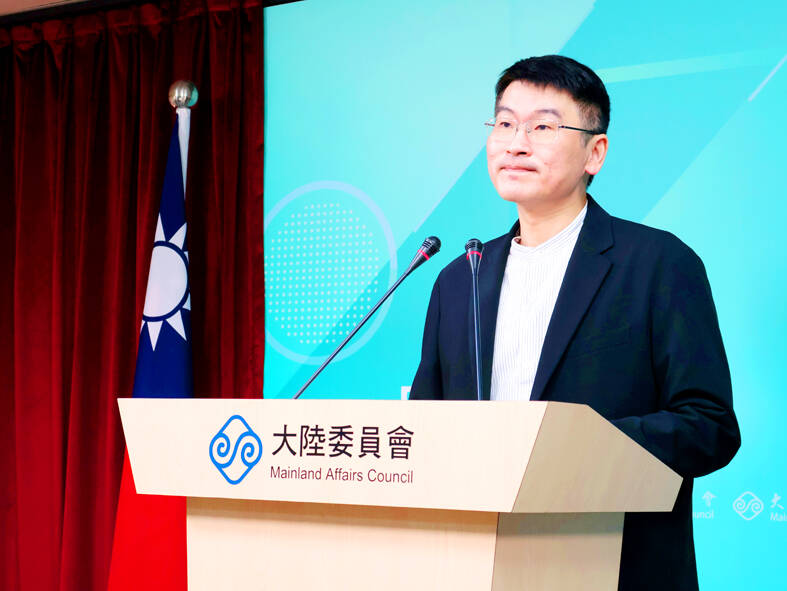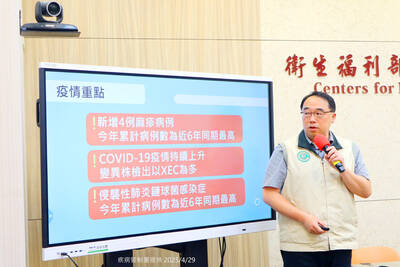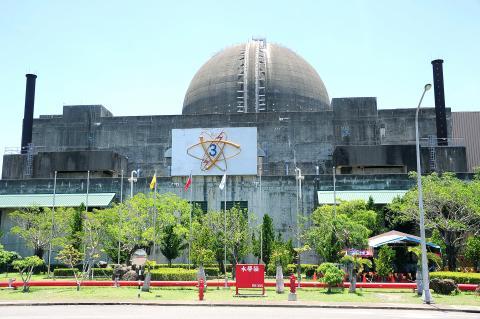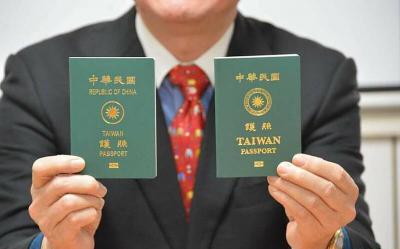The travel alert for China would remain “orange,” even though China has been declared a “hostile foreign force,” the Mainland Affairs Council told reporters in Taipei yesterday.
The council was asked whether there would be any change in the travel alert after President William Lai (賴清德) said Beijing’s increasing infiltration efforts against Taiwan has made it a “hostile foreign force” as defined by the Anti-infiltration Act (反滲透法).
“We raised the travel alert to orange, because Beijing has been attempting to destroy the Republic of China and has intimated Taiwanese by detaining and arresting them without following due process and implementing 22 guidelines that allow its courts to try in absentia and sentence to death so-called ‘diehard’ Taiwanese independence activists,” Mainland Affairs Council Deputy Minister and spokesperson Liang Wen-chieh (梁文傑) told a news conference.

Photo: CNA
“We had already taken political factors into consideration when adjusting the travel alert, which would remain orange for now. We did not see the necessity to further raise the travel alert to red,” he said.
Some tourism operators have expressed concern that people would soon be asked to register their trips to China with the government, as stated by the president in his speech last week, saying the requirement would dampen interest in visiting China and consequently affect their business.
In response, Liang said that the registration is intended as a safety measure.
“We have been clear all along that the registration for travelers to China is not mandatory and would not be used to control their whereabouts. Rather, it is to let travelers know ways to seek assistance in emergency situations,” he said.
Liang was also asked whether the government should consider raising travel alerts to certain countries that have close relations with China and might collude with Beijing to extradite Taiwanese independence advocates to China.
He said that the council has yet to see countries extradite people to China on charges of secession.
“We have examined extradition treaties China signed with 60 countries. A person is not likely to be extradited unless their action is deemed a crime in both countries. China is perhaps one of the few countries that consider secession a crime, but we do not exclude the possibility that certain countries might be very cooperative with China on this matter. We will ask Taiwanese travelers to be particularly cautious when traveling in these countries, but so far we have not seen any such cases,” he said.
On the Ministry of Education’s suggestion that students in primary and junior-high schools avoid participating in cross-strait exchanges, Liang said that China has indeed switched its focus to influencing Taiwan’s next generation.
“From our perspective, we would not issue a comprehensive ban on cross-strait exchange activities for primary and junior-high students. However, we hope that such activities would be depoliticized and secure unanimous approval from parents’ associations, rather than an unilateral decision from the school staff and faculty,” he said.

A fugitive in a suspected cosmetic surgery fraud case today returned to Taiwan from Canada, after being wanted for six years. Internet celebrity Su Chen-tuan (蘇陳端), known as Lady Nai Nai (貴婦奈奈), and her former boyfriend, plastic surgeon Paul Huang (黃博健), allegedly defrauded clients and friends of about NT$1 billion (US$30.66 million). Su was put on a wanted list in 2019 when she lived in Toronto, Canada, after failing to respond to subpoenas and arrest warrants from the Taipei District Prosecutors’ Office. Su arrived at Taiwan Taoyuan International Airport at 5am today on an EVA Air flight accompanied by a

COVID-19 infections have climbed for three consecutive weeks and are likely to reach another peak between next month and June, the Centers for Disease Control (CDC) said yesterday. Weekly hospital visits for the disease increased by 19 percent from the previous week, CDC Epidemic Intelligence Center Director Guo Hung-wei (郭宏偉) said. From Tuesday last week to yesterday, 21 cases of severe COVID-19 and seven deaths were confirmed, and from Sept. 1 last year to yesterday, there were 600 cases and 129 deaths, he said. From Oct. 1 last year to yesterday, 95.9 percent of the severe cases and 96.7 percent of the deaths

Restarting the No. 2 reactor at the Ma-anshan Nuclear Power Plant would take up to 18 months, Minister of Economic Affairs J.W. Kuo (郭智輝) said today. Kuo was answering questions during a meeting of the Legislative Yuan’s Economics Committee, where legislators are considering amendments to the Renewable Energy Development Act (再生能源發展條) amid concerns about the consequences of the Pingtung County reactor’s decommissioning scheduled for May 17. Its decommissioning is to mark the end of Taiwan’s nuclear power production. However, Chinese Nationalist Party (KMT) lawmakers have proposed an amendment to the Nuclear Reactor Facilities Regulation Act (核子反應器設施管制法) that would extend the life of existing

The Ministry of Foreign Affairs yesterday demanded that Somalia reverse its decision prohibiting Taiwanese passport holders from entering or transiting through the country. Somalia said it is following the “one China” principle based on UN Resolution 2758. The ministry said that Somalia is misinterpreting the resolution under China’s instigation, creating a false impression that Taiwan is subordinate to China. The Somali Civil Aviation Authority told airlines on Tuesday last week that starting today, any passengers with passports or travel documents issued from Taiwan or its affiliated institutions would not be allowed to enter or transit through Somalia. The decision comes as Taiwan is boosting